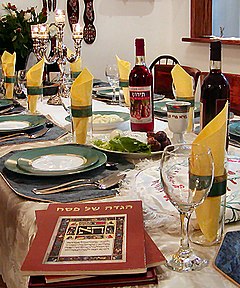Pesach
| Passover | |
|---|---|

A table set up for a Passover seder.
|
|
| Official name | Pesach – פסח (in Hebrew). |
| Observed by | Jews. (In various forms also by: Samaritans; Messianic Jews; some groups claiming affiliation with Israelites). |
| Type | Jewish and Samaritan (One of the Three Pilgrim Festivals), cultural |
| Significance |
Celebrates the Exodus, the freedom from slavery of the Children of Israel from ancient Egypt that followed the Ten Plagues. |
| Celebrations | In Jewish practice, one or two festive Seder meals – first two nights; in the times of the Temple in Jerusalem, the Passover sacrifice. In Samaritan practice, men gather for a religious ceremony on Mount Gerizim that includes the ancient lamb sacrifice (7th day) |
| Begins | 15th day of Nisan |
| Ends | 21st day of Nisan in Israel, and among some liberal Diaspora Jews; 22nd day of Nisan outside of Israel among more traditional Diaspora Jews. |
| 2016 date | sunset of Friday 22 April to nightfall of Friday 29 April / Saturday 30 April (7th day) |
| 2017 date | sunset of Monday 10 April to nightfall of Monday 17 April / Tuesday 18 April (7th day) |
| Related to | Shavuot ("Festival of Weeks") which follows 49 days from the second night of Passover. |
Celebrates the Exodus, the freedom from slavery of the Children of Israel from ancient Egypt that followed the Ten Plagues.
Beginning of the 49 days of Counting of the Omer
Passover or Pesach (/ˈpɛsɑːx, ˈpeɪsɑːx/; from Hebrew פֶּסַח Pesah, Pesakh, Assyrian; ܦܸܨܚܵܐ "piskha"), is an important, biblically derived Jewish holiday. The Jewish people celebrate Passover as a commemoration of their liberation by God from slavery in Egypt and their freedom as a nation under the leadership of Moses. It commemorates the story of the Exodus as described in the Hebrew Bible especially in the Book of Exodus, in which the Israelites were freed from slavery in Egypt. According to standard biblical chronology, this event would have taken place at about 1300 BCE (AM 2450).
...
Wikipedia
